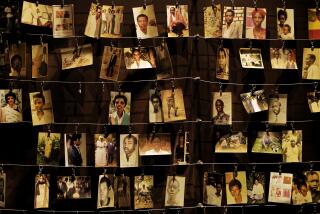NEWS ANALYSIS : Agony at the Top: Bosnia May Be a Clinton Vietnam
- Share via
WASHINGTON — If agony in high places is any measure, the war in Bosnia is already President Clinton’s Vietnam.
The President says that it is the issue he cannot stop worrying about at the end of the day; he takes the problem home at night and hashes it over with his wife, Hillary Rodham Clinton. The tragedy in the Balkans is “not only heartbreaking,” he said this week, “it’s infuriating.”
And Secretary of State Warren Christopher, a notably unemotional man, throws up his hands at the subject. “This is a problem from hell,” he declared. On Wednesday, Christopher met privately with author and Holocaust survivor Elie Wiesel to discuss the issue’s moral implications.
Clinton’s advisers have huddled for hours over the last three weeks to thresh out options for diplomatic and military action--and still have not reached a decision.
Like Lyndon B. Johnson, whose presidency was wrecked by the American military intervention in Vietnam, Bill Clinton faces an agonizing conflict between his international ideals and the potential cost of achieving them.
Beginning in last year’s presidential campaign, Clinton declared that the United States had a responsibility to stop the onslaught of Bosnia’s Serbs against the republic’s other ethnic groups, the Croats and Muslims. “We have an interest in standing up against the principle of ‘ethnic cleansing’ . . ,” he said earlier this month. “If you look at the other places where this could play itself out in other parts of the world, this is not just about Bosnia.”
Yet the President’s attempt to stop the Serbs through diplomatic pressure has failed. So Clinton, only three months into his presidency, faces an unpalatable choice between escalation and retreat--that, and a swelling national debate over the limits of American responsibility.
Since the fall of Saigon in 1975, Americans have argued over every potential military intervention in terms of Vietnam, whether the battlefield was Lebanon, Central America, the Balkans and even Desert Storm in its early days. Is Bosnia another quagmire, a war America should not enter because its price in blood will inevitably run too high? Or is it, as Christopher has asked, another Holocaust--a tragedy America must stop because the cost in innocent lives--and to America’s moral conscience--is too great to ignore?
All historical analogies are inexact, of course. But Vietnam and the Holocaust are the twin phantoms that haunt the Clinton Administration’s debate over what to do in the Bosnian highlands.
Last week, at the opening of Washington’s new Holocaust Memorial Museum, Clinton found himself confronted directly with one of history’s unwelcome ghosts, when Wiesel appealed to him to stop the war in Bosnia: “Something, anything must be done,” Wiesel pleaded.
At the same time, members of Congress and senior military officers are increasingly warning of the other pitfall. “All of us want to stop the tragedy in Bosnia,” said Sen. John McCain (R-Ariz.), a former pilot who spent five years as a prisoner of war in North Vietnam. “But . . . I’m not willing to risk another Vietnam.”
Clinton has tried to defuse such fears by promising that he is only considering the use of air power in Bosnia, not the introduction of ground troops. Responds McCain, “The fact is, militarily, if you want to affect the situation, you have to inject massive (numbers of) ground troops.”
The President and his advisers do not like the Vietnam analogy but they cannot escape it. Their own careers, their ways of thinking, were forged in the crucible of the nation’s longest war.
White House National Security Adviser Anthony Lake resigned his first White House job--under Richard M. Nixon, in 1970--to protest the relentless escalation of the war. Defense Secretary Les Aspin served as a young Army lieutenant on the Pentagon staff that planned the conflict. Secretary of State Warren Christopher, then a Justice Department official, was assigned to quell the sometimes-violent protests that followed.
And Clinton spent his college years struggling with the issue of the war--whether to volunteer, to resist the draft or, as he finally chose, to maneuver his way out of military service.
On the ground, diplomats and military experts say, Bosnia is not much like Vietnam at all--except, perhaps, for its mountains. In Vietnam, the United States faced a well-armed guerrilla army hardened by years of war against the colonial French. In Bosnia, the Serb militias are said to be ill-trained and ill-disciplined, and their weapons, while effective against their lightly armed Muslim foes, would have little effect against U.S. air power.
In Vietnam, the Communists had an important strategic ally in the Soviet Union. “That had a restraining influence on Johnson, who didn’t want to risk a nuclear confrontation with Moscow,” noted Patrick Glynn of the American Enterprise Institute. “The Serbs don’t have a big brother with nuclear weapons.”
Where the Vietnam analogy is most telling, officials said, is not in the hills of Bosnia but in the corridors of official Washington. Once again, an Administration is thinking about intervention in a tangled civil war--and hoping to find a low-cost way to do it.
“Are we looking at a pattern of decision-making that looks like Vietnam?” asked Glynn, who has advocated military intervention in Bosnia. “I worry that the Administration is falling into an old pattern--a gradualist approach that commits us to action but takes only small steps that don’t solve the problem.”
“The idea of taking only intermediate steps is very dangerous,” agreed John Steinbruner of the Brookings Institution.
“I really do sympathize with Clinton’s dilemma,” he added. “This could blow him out of the water. But I don’t think he can stay out and get away with it. And I don’t think he can do it the easy way. I’m afraid he’s going to have to organize an international coalition and intervene in a big way.”
So far, no one in the Administration has publicly called for that kind of massive intervention, which would presumably include the use of U.S. and allied ground troops. Instead, Clinton and his Cabinet appear closely divided over more limited options--principally, lifting a U.N. embargo to allow the Bosnian Muslims to import weapons and launching air strikes against the Serbs to stop their offensive and force them back to peace talks.
Clinton himself initially tried to stay away from the issue, aides said, hoping he could avoid being diverted from his ambitious domestic agenda. But in recent weeks, he has reluctantly concluded that he cannot escape. “I think it is a challenge to all of us . . . to take further initiatives in Bosnia,” he declared at the Holocaust museum last week. “I accept it.”
And Clinton has accepted the argument that a small, symbolic military action would be worse than none at all. “That shouldn’t be done just to say that people . . . will feel better that we did something,” he said in an interview with the Boston Globe earlier this week.
But he has not worked out how to enforce those high principles in practice. “The essence of the matter isn’t just punishing the Serbs. It’s establishing a principle that this is a breakdown in the world’s civil order and the world has to respond,” said Steinbruner.
Clinton, Christopher and others like to note that the dilemma in Bosnia is one that they inherited from the previous Administration of President George Bush.
But that is becoming cold comfort, as the problem rapidly becomes theirs as well.
“If Bush were in power, he’d be facing the same problems,” Steinbruner noted. “But Bush ignored the problem. The Democrats are reacting the way they do because they have a harder time writing these things off. They’re less ruthless about it. They worry more about the moral questions in foreign policy . . . and so they fall into the natural trap of trying to do something, but not too much.”
More to Read
Get the L.A. Times Politics newsletter
Deeply reported insights into legislation, politics and policy from Sacramento, Washington and beyond. In your inbox three times per week.
You may occasionally receive promotional content from the Los Angeles Times.











